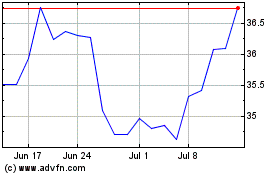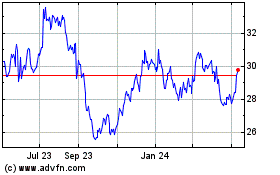Dell Reveals Financial Results for First Time Since Going Private
December 14 2015 - 7:20PM
Dow Jones News
Dell Inc. on Monday disclosed quarterly financial results for
the first time since late 2013, when the company reverted from
public to private ownership.
The disclosure, which appeared in a regulatory filing to the
Securities and Exchange Commission by Dell Holding Inc., owner of
Dell Inc., underlines a major question in Dell's blockbuster $67
billion bid to acquire EMC Corp.: how the computer maker would pay
off the massive debt it must take on to buy the storage
company.
The deal, announced in October, would create a
corporate-computing giant by combining Dell's PC and server sales,
primarily to consumers and small to medium-size businesses, with
EMC's storage business, which focuses on large corporations.
Dell's results show the company facing the same pressures as
rivals such as International Business Machines Corp. and the former
Hewlett-Packard Co., which in November split into separate
corporate-computing and PC-and-printer companies.
Dell saw revenues decline by 6% year on year to $14 billion in
its quarter ended in July. Unlike those competitors, however,
Dell's revenues were up in the company's fiscal year ended January
2015, rising 5%.
"Dell has executed well. We've invested wisely to drive future
growth, and we're pleased with our performance," said David Frink,
a company spokesman.
Dell has paid off $4.5 billion in debt over the past two years,
but those payments left the company with less cash than it had when
it traded publicly, and the move to private management hasn't
boosted profits.
During Dell's fiscal 2015, the company's operating profit
totaled $3.2 billion excluding charges. In 2013, that figure was $4
billion.
"These numbers reinforce that it's going to be a highly
leveraged transaction," said Toni Sacconaghi, an analyst at Sanford
C. Bernstein & Co. He believes that Dell will assume a sizable
$51 billion in debt to conclude the deal.
"It's no surprise that they're looking to try and sell some
assets," he added.
Earlier this year, Dell filed for an initial public offering of
its SecureWorks division, a business that could be worth as much as
$2 billion. The company is contemplating roughly $10 billion in
further divestitures that could include its IT services business,
as first reported by the technology website Re/Code and confirmed
by a source familiar with Dell's plans. Other possible asset sales
include operations of previous Dell acquisitions Boomi Inc., Quest
Software Inc., and SonicWall Inc.
EMC could sell its RSA Security LLC division to reduce the
deal's size, said Daniel Ives, an analyst with FBR & Co.
Other tactics to lighten the debt load haven't worked out so
well. EMC on Monday scrapped plans to merge Virtustream, a cloud
computing division, with parts of VMware, a publicly traded EMC
subsidiary. The deal—which was roundly disliked by VMware
investors—could have freed up cash for the combined Dell and EMC by
shifting to VMware some capital costs of building Virtustream's
servers and data centers.
The filing shows that the combined Dell and EMC would have free
cash flow of around $7 billion, enough to give some reassurance to
investors worried about the debt, according to Mr. Ives.
"Relative to the Dell piece, I think it shows pretty good
stabilization," he said. "I think they've done a commendable job on
profitability and the all-important free-cash-flow metrics."
There may be other stumbling blocks ahead, however. Aside from
regulatory and antitrust hurdles, shareholders have filed 13
class-action lawsuits against the companies and directors involved
in the deal, and the Internal Revenue Service could hit Dell with
an unexpected tax bill over its issuance of a VMware tracking
stock, according to the filing.
One major roadblock in the rearview mirror, though: A "go shop"
provision that allowed EMC to seek out other suitors expired on
Saturday. EMC shareholders may vote on the deal as soon as next
summer.
Write to Robert McMillan at Robert.Mcmillan@wsj.com
(END) Dow Jones Newswires
December 14, 2015 19:05 ET (00:05 GMT)
Copyright (c) 2015 Dow Jones & Company, Inc.
HP (NYSE:HPQ)
Historical Stock Chart
From Mar 2024 to Apr 2024

HP (NYSE:HPQ)
Historical Stock Chart
From Apr 2023 to Apr 2024
